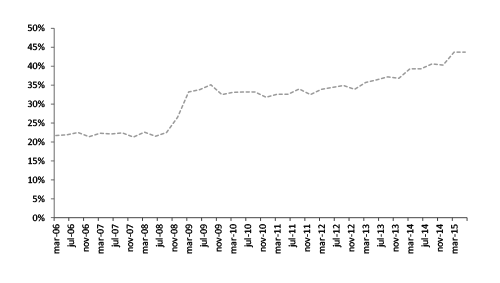In July 2011 I published a blog entry entitled "Greek Lessons," where I described the terrible plight and noted that financial discipline is always important, but especially so in the public sector given the danger of excessive government spending.
Four years down the road, we see the lesson was not learned. The situation in Greece, far from improving, has worsened and led Athens to sign a third bailout agreement with still harsher conditions. Paradoxically, on September 20, Greece held parliamentary elections that, as incredible as it might seem, resulted in the re-election of the radical left, led by Alexis Tsipras. The election shows the problem in Greece goes far beyond a fiscal deficit. Today, the land of Aristotle and Plato is adrift and not finding a road to modernity.
The root of the Greek crisis lies in the mindset of an aging nation that is unable to accept the urgent need for deep reform to make the country more competitive. Greece has a growing preference for protectionism, accruing debt, and over-regulation. Corruption is tolerated, while any measure that promotes competition, innovation, and productivity is viewed with suspicion.
In his recent article, "The Foundation of Greece's Failed Economy," noted economist Edmund S. Phelps analyzes the situation clearly. He refutes economists such as Paul Krugman and Joseph Stiglitz, who blame fiscal austerity for rising unemployment. In Phelps' opinion, the real problem is that Greek politics are plagued with cronyism and corruption.
For Phelps, two important sources of broad prosperity are blocked by Greece's system. "One is an abundance of entrepreneurs engaged in detecting and exploiting new economic opportunities. Without them, Greece does a poor job of adjusting to changing circumstances (...) The other source of broad prosperity is an abundance of business people engaged in conceiving and creating new products and processes."
Phelps believes that the solution to the Greek crisis goes far beyond debt reduction or fiscal adjustment. If young Greeks want to have a future in their country, they need to break with attitudes and institutions characteristic of a pre-modern economy.
Two Mexicos
We must learn from this experience. Coincidentally, in the September 19 edition of The Economist, the cover story mentioned the existence of "two different Mexicos" and the lessons this represents for development. On the one hand, in Mexico we have ultra-competitive, modern, and globalized companies that adhere to world standards of quality and efficiency. We also have young people who are prepared, productive, and hardworking. In the words of The Economist, "Mexico has Latin America's largest and most sophisticated industrial base."
On the other hand, we are also plagued by cronyism, corruption, severe deficiencies in the rule of law, and populist tendencies. In this environment, the Inter-American Development Bank recently characterized the levels of poverty that still exist in Mexico as "alarming."
Today we must be careful to avoid following the Greek path. In Mexico, in the past few years, several hot spots have emerged: (1) since 2014, the fiscal burden has increased considerably, appreciably affecting producer and consumer confidence. This has led to stagnant gross fixed investment, not to mention widespread impoverishment caused by higher taxes; (2) the regulatory burden is also increasing year after year, which has discouraged the creation of companies and jobs (3) the federal debt as a percentage of gross domestic product has doubled in the past few years, according to data from the Finance Ministry (as noted in the chart). All these points are very bad news for Mexico and accruing public debt is always a false solution that affects future generations and is especially harmful.
It is essential that in Mexico we ignore the false promises of populism, we move forward in the fight against corruption, and avoid public policies that have led countries such as Greece, Venezuela, Argentina, and most recently Brazil, to ruin.
It is also important to achieve a fiscal reform that promotes job creation and investment. Today we find in the world and in our own Mexico economic policies and lessons that are very harsh but also are key, which we must never forget so that what is occurring in Greece does not happen here.

